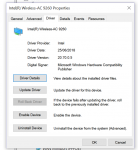Bit of background, I work in End User Computing and also look after my sons small Primary school for their IT. We have purchased a few Ultranote IVs and am very happy with them in general.
One particular machine has been problematic. The wireless card fails, after a period windows notices it, resets the card and boom, we are working again. The issue happens intermittently, perhaps once a day or perhaps 5 times. End user experiences no network connection, maybe for 20 minutes. Each time it's recorded in the event log.

Windows 10 v1803 and also latest intel WifI Driver (20.70.0.5). Build from fresh (and remember, we have a few of these laptops, it's just this one playing up)


it's happen since new, so I got in touch with PC Specialist who were very good and they sent me a replacement WiFi card. Fitted before the end of school term, thought was ok but same issue happened. Rebuilt machine, crossed fingers... but no, same issue persists.
I have
I don't have any other compatible WiFi cards that are that particular interface type so I can't compare like for like, but given we've a few of these machines which are flawless and unless the replacement card from PC specialist has the same fault as the first, I can only conclude the motherboard itself is faulty in some mulder-and-scully type way.
I'll get back in touch with Pc specialist support, just posting here to see if anyone else has this or any bright ideas!
One particular machine has been problematic. The wireless card fails, after a period windows notices it, resets the card and boom, we are working again. The issue happens intermittently, perhaps once a day or perhaps 5 times. End user experiences no network connection, maybe for 20 minutes. Each time it's recorded in the event log.

Windows 10 v1803 and also latest intel WifI Driver (20.70.0.5). Build from fresh (and remember, we have a few of these laptops, it's just this one playing up)


it's happen since new, so I got in touch with PC Specialist who were very good and they sent me a replacement WiFi card. Fitted before the end of school term, thought was ok but same issue happened. Rebuilt machine, crossed fingers... but no, same issue persists.
I have
- Modified the WiFi power saving settings
- Modified the Machine power saving settings including turning off quick boot
- Trawled through event logs to see any correlation with anything else
- Used the older drivers on the PCspecialist site as well as the newest intel
- Googled it to death - a couple of posts in the intel forums but little of use and mainly boilerplate text from intel then saying 'go away, it's not supported by us'
- Ran it on a different WiFi network (issue presented itself earlier today whilst it was otherwise doing nothing at my house)
- Ran it on a differnet power supply ( can you tell I'm clutching at straws now)
I don't have any other compatible WiFi cards that are that particular interface type so I can't compare like for like, but given we've a few of these machines which are flawless and unless the replacement card from PC specialist has the same fault as the first, I can only conclude the motherboard itself is faulty in some mulder-and-scully type way.
I'll get back in touch with Pc specialist support, just posting here to see if anyone else has this or any bright ideas!

